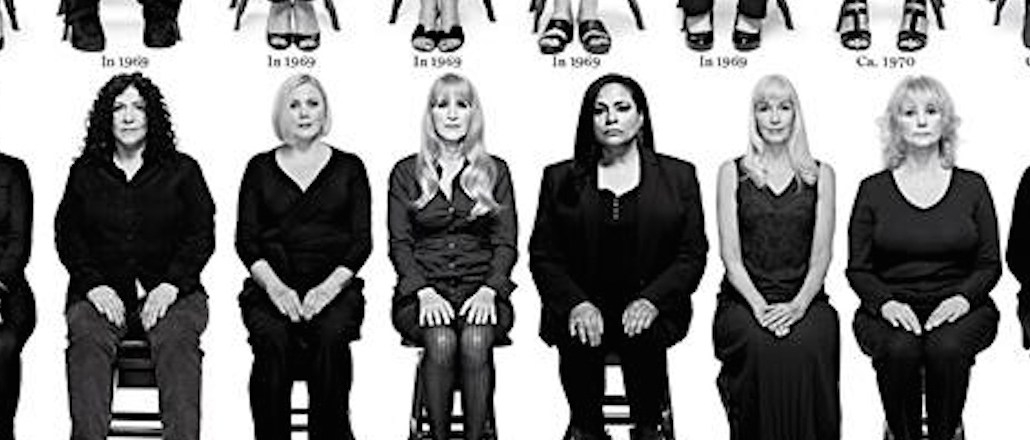Save 50% on a 3-month Digiday+ membership. Ends Dec 5.
How #TheEmptyChair became the unofficial hashtag of New York Magazine’s Cosby cover

New York Magazine’s latest cover is instantly iconic. Pictured in black-and-white, it shows 35 women sitting down who have accused Bill Cosby of sexual assault with the powerful headline “Cosby: The Women. An unwelcome sisterhood.” An empty chair was also included to “signify those who have stayed silent.”
Written by Noreen Malone and Amanda Demme, the tremendous piece of journalism profiles each woman’s story with the comic, who would allegedly spike their drink with drugs and sexually assault them when they’re unconscious or impaired. Cosby has publicly denied the accusations, although a 2005 deposition of Cosby uncovered by the New York Times last week appears to confirm the victims’ stories.
Besides teasing it on Friday from its PR Twitter account, the story followed the usual roll-out of being published online the Sunday evening before the hardcopy hits newsstand on Monday. But it didn’t need any extra promotion as it quickly pinballed throughout the Internet and social media.
The first tweet from the magazine’s official account showing the cover racked up 11,000 retweets and 6,400 favorites. On Facebook, the cover garnered 7,700 likes and 5,800 shares with 600 comments. On Instagram, New York Magazine sliced up audio interviews from three of women punctuated with art illustrating their quotes.
35 women speak about being assaulted by Bill Cosby, and the culture that wouldn’t listen: https://t.co/H5dss5F2F4 pic.twitter.com/RCF0BWBrxA
— New York Magazine (@NYMag) July 27, 2015
But it was only on social media (and several other websites, including Vox, Gawker, Salon, Slate, etc. that aggregated it) where could readers find the story. New York Magazine’s website became inaccessible overnight because of a hacker who told the Daily Dot that they took it down because of their hatred for New York City. The website is still not back online as of this morning.
Interestingly, it wasn’t a hashtag created by New York Magazine that drove the conversation on Twitter, rather it was one made by users: #TheEmptyChair. It represents victims who are too scared to come forward because of shame or further abuse. Elon James White, journalist and editor of This Week in Blackness, first used the hashtag in relation to the cover, according to social media analytics firm Topsy. After tweeting the cover, he noticed that his followers were fixated on the empty chair and created the hashtag. His timeline is filled with anonymous direct messages relating to being the person too scared to come forward.
A DM sent to me: #TheEmptyChair pic.twitter.com/KkmGhaeTNx — Elon James White (@elonjames) July 27, 2015
A DM sent to me: “I can’t share my empty chair story bc I signed an NDA. needed the money more than justice, and he knew it” #TheEmptyChair
— Elon James White (@elonjames) July 27, 2015
Ad position: web_incontent_pos1
A DM sent to me: #TheEmptyChair pic.twitter.com/VEZEOJwMaw — Elon James White (@elonjames) July 27, 2015
More than 10,000 tweets affixed with the hashtag #TheEmptyChair have been used, per data from Brandwatch.
“There is virtually no negative sentiment around this individual hashtag as the public has rallied on social to relay a message of support for sexual assault and rape victims who feel alone and helpless based on the most frequently mentioned topics in the conversation,” said analyst Kellan Terry.
The conversation surrounding the 35 women appearing on the cover has been supportive, with many users calling for change in how victims of sexual assault and rape are treated. Overall, women on Twitter are leading the conversation, amounting to 57 percent, compared to 43 percent men.
More in Media

What publishers are wishing for this holiday season: End AI scraping and determine AI-powered audience value
Publishers want a fair, structured, regulated AI environment and they also want to define what the next decade of audience metrics looks like.

Digiday+ Research Subscription Index 2025: Subscription strategies from Bloomberg, The New York Times, Vox and others
Digiday’s third annual Subscription Index examines and measures publishers’ subscription strategies to identify common approaches and key tactics among Bloomberg, The New York Times, Vox and others.

From lawsuits to lobbying: How publishers are fighting AI
We may be closing out 2025, but publishers aren’t retreating from the battle of AI search — some are escalating it, and they expect the fight to stretch deep into 2026.
Ad position: web_bfu